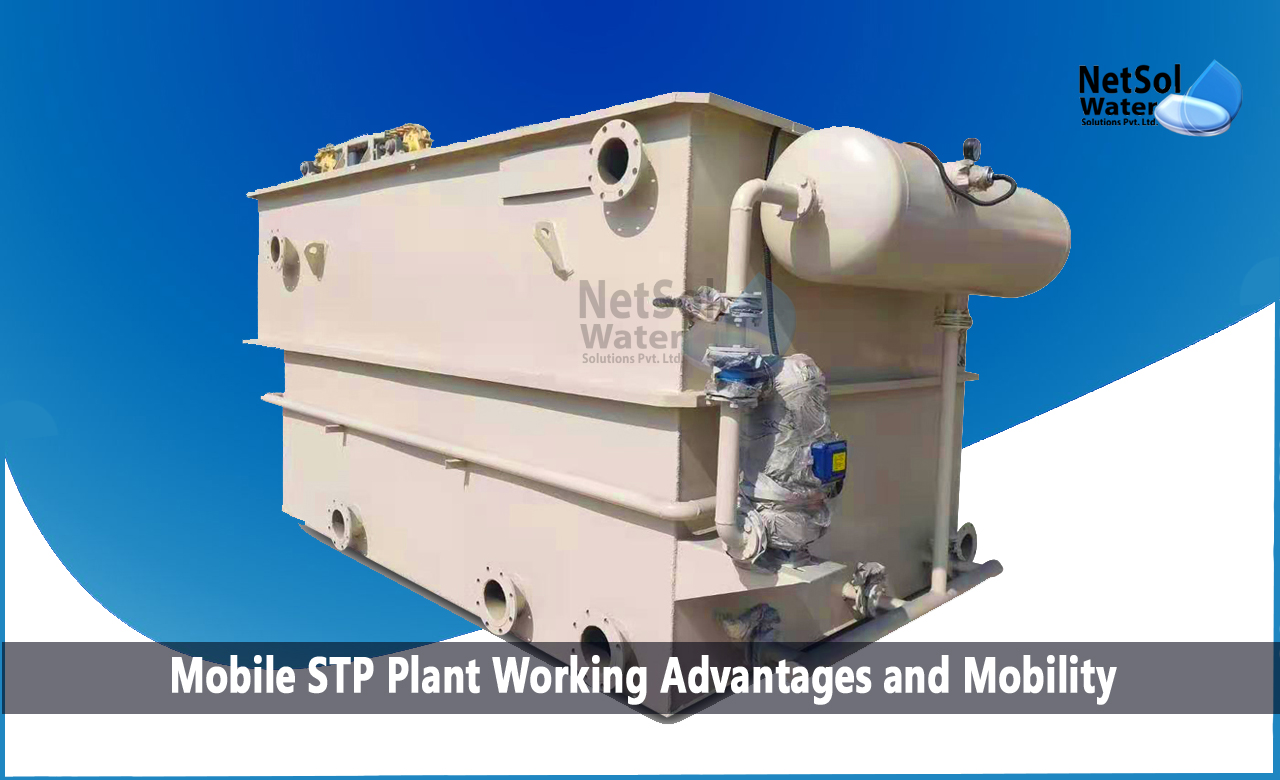Mobile STP Plant: Its Working, Advantages, and Mobility
Wastewater treatment is an essential process that helps protect the environment and human health. However, in many cases, the cost of building a permanent sewage treatment plant (STP) can be prohibitively high, especially in areas with limited space or infrastructure. A mobile STP plant can be a cost-effective and flexible solution for these situations.
Now we will explore what a mobile STP plant is, how it works, how it differs from a normal STP plant, and how it can be moved from one place to another.
What is a Mobile STP Plant?
A mobile STP plant is a self-contained wastewater treatment unit that can be easily moved from one location to another. It is a compact and flexible system that can be used in a variety of applications, including construction sites, mining operations, military bases, disaster relief efforts, and other temporary or remote locations. The mobile STP plant is designed to treat wastewater generated by human activities and discharge the treated water into the environment or reuse it for non-potable purposes.
How Does a Mobile STP Plant Work?
The mobile STP plant follows a similar process as a conventional STP plant, but in a smaller and more compact design. The process generally involves four stages: primary treatment, secondary treatment, tertiary treatment, and disinfection.
1. Primary Treatment:
In this stage, the incoming wastewater is screened to remove large objects and then passed through a grit chamber to remove sand, gravel, and other heavy particles. This stage also includes sedimentation or settling tanks, where the solids are allowed to settle to the bottom, and the clarified water is separated from the solids.
2. Secondary Treatment:
In this stage, the settled wastewater is treated with microorganisms to break down the organic matter and nutrients present in the wastewater. The microorganisms convert the organic matter into carbon dioxide, water, and other stable substances. The most common secondary treatment method is the activated sludge process, where the wastewater is mixed with a mixture of microorganisms and oxygen in an aeration tank. The microorganisms consume the organic matter and nutrients and produce a biomass that settles in a clarifier. The clarified water is then discharged or sent to the next stage of treatment.
3. Tertiary Treatment:
In this stage, the clarified water is treated with additional processes to remove any remaining contaminants or impurities. This stage may include filtration, chemical treatment, or membrane processes, depending on the desired water quality and discharge standards.
4. Disinfection:
In this final stage, the treated water is disinfected with chlorine or other disinfectants to kill any remaining pathogens or bacteria. The water is then ready for discharge or reuse.
How is a Mobile STP Plant Different from a Normal STP Plant?
The main difference between a mobile STP plant and a normal STP plant is the size and design. A mobile STP plant is designed to be compact, portable, and easy to set up and operate. It is typically housed in a container or trailer that can be transported by truck, rail, or ship to the desired location. A normal STP plant, on the other hand, is a permanent facility that is designed to treat large volumes of wastewater over an extended period. It is typically built on a large piece of land and includes extensive infrastructure, such as pipelines, pumps, and treatment units.
Advantages of Mobile STP Plant:
· Flexibility: A mobile STP plant is a flexible solution that can be easily moved from one location to another as needed. It is ideal for temporary or remote applications where a permanent facility is not feasible.
· Cost-Effective: A mobile STP plant can be a cost-effective solution compared to building a permanent facility, especially for short-term projects or locations with limited space or infrastructure.
· Easy to Operate: A mobile STP plant is designed to be user-friendly and easy to operate. It requires minimal training and can be set up and ready to operate quickly.
· Environmental Protection: A mobile STP plant can help protect the environment by treating wastewater and preventing pollution of water resources.
· Water Reuse: A mobile STP plant can produce high-quality treated water that can be reused for non-potable purposes, such as irrigation or industrial processes.
How Can a Mobile STP Plant be Moved from One Place to Another?
A mobile STP plant is designed to be easily transported from one location to another. It is typically housed in a container or trailer that can be loaded onto a truck, rail car, or ship for transportation. The plant is pre-fabricated and pre-assembled, making it easy to set up and operate at the destination site. The plant can be powered by a generator or connected to the local power grid, depending on the availability of power.
Summary:
In conclusion, a mobile STP plant is a cost-effective, flexible, and environmentally friendly solution for treating wastewater in temporary or remote locations. The plant follows a similar process as a normal STP plant but is designed to be compact, portable, and easy to set up and operate. The mobile STP plant can be moved from one place to another, making it an ideal solution for short-term projects or locations with limited space or infrastructure. The mobile STP plant can produce high-quality treated water that can be reused for non-potable purposes, further reducing the environmental impact of wastewater.
Leading manufacturer of sewage treatment plants in India.
Netsol Water is the leading manufacturer, supplier, and exporter of a quality selection of water treatment, and wastewater treatment products in India, by using advanced sewage treatment methods.
RO plants, water softeners, ETPs, STPs, DM plants, AMC, O&M, Ultra filtration, UV, Ozonation, ZLD plants, Anoxic tanks, and other goods and services are available from us. We also provide services to businesses in sectors including automotive, pharmaceutical, textile, pulp & paper, beverages, refineries, schools, hospitals, office buildings, and hotels, among others.
Call us at +91 9650608473 or email at enquiry@netsolwater.com for further information.



